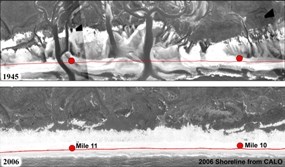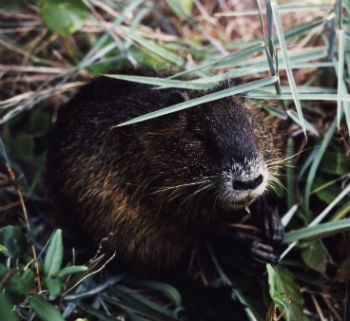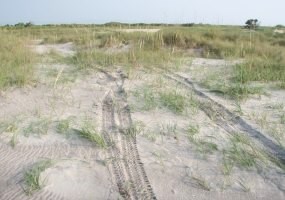|
The environmental factors which affect the plants, animals, and islands of Cape Lookout include everything from the natural influences of weather and animal grazing to human effects like litter and destruction of dunes. Some of the effects of these environmental factors are easily visible (like the opening of a new inlet by a storm) while others (such as changes to the location of the islands) are very slow processes which can not be seen with the naked eye. 
Stanley Riggs & Dorothea Ames, Department of Geological Sciences, East Carolina University Wind and WavesBarrier islands, like Shackleford and the Core Banks, are naturally dynamic geologic features. The most dramatic changes are brought about by hurricanes and other storm force winds. The winds which accompany these storms blow sands down the shoreline and blow waves across the island, carrying sands with them. These storms can open inlets, erode beaches, and build up the marshes on the soundside of the island. However, the wind and waves do not need storms to reshape an island. The gradual migration of sand as it is blown by winds and carried by waves constantly alters the shape and location of barrier islands in such a way that the passage of a few decades, even with few or small-scale storms, can radically alter the landscape. An example of this change can be seen in the image above. (Note: the red line marks the location of the shoreline in 2006 at high tide and the circles indicate the mile markers for mile 10 and mile 11. The lighter areas represent higher elevations while the darker areas indicate lower elevation, water, or vegetation.) 
NPS Photo Plants and AnimalsHerbivores graze on the dune stabilizing grasses. Plants and animals compete for limited resources--such as food, water, and territory. Balancing this impact is important to the health of these islands. The park works to ensure that the non-native species do not do permanent harm to the native species or landscape and to protect endangered and threatened species from excessive predation and competition. In the case of the Shackleford horse herd, the impact of these non-native animals is recorded and controlled. The herd size is limited through the use of contraceptives and the removal of selected young horses. This helps prevent the horses from over-grazing and causing lasting damage to the island, their own food supply, and the food supply of the other animals which live on Shackleford Banks. For more information, read the Horses of Shackleford Banks webpage. 
NPS Photo Human ImpactsThe mission of Cape Lookout National Seashore is to balance human use and recreation with the preservation of the park's natural and cultural resources. Without proper care, people can have a devastating impact on natural ecosystems. Walking or driving over vegetation can not only damage or destroy those plants it can also destroy the root systems which stabilize these islands. Trash left behind can kill wildlife when the trash is mistaken for food. Feeding animals teaches them to beg for scraps and may cause them to become dependent on human food for survival. Once habituated to humans, animals in their search for food can become more agressive towards humans. Many protected species avoid areas where people like to gather. Certain birds, in particular, will abandon nests when people get too close--leaving their eggs vulnerable to the heat of the sun. Other birds have nests and eggs which are so small and blend in with the beach so well that drivers and pedestrians can accidentally crush the eggs or kill the chicks as they pass through the area. In addition, sea turtle hatchlings can become trapped in tire tracks on their way to the ocean. For all of these reasons, Cape Lookout National Seashore temporarily closes certain areas to reduce the impact of visitors on wildlife. To reduce human impact on the islands, visitors should:
|
Last updated: October 20, 2023
